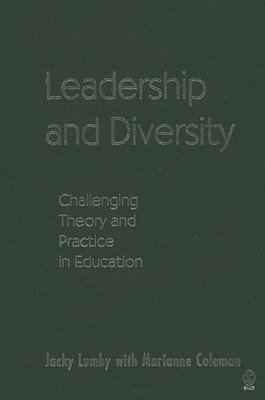
- We will send in 10–14 business days.
- Author: Jacky Lumby
- Publisher: SAGE Publications Ltd
- ISBN-10: 1412921821
- ISBN-13: 9781412921824
- Format: 17.3 x 24.2 x 1.5 cm, kieti viršeliai
- Language: English
- SAVE -10% with code: EXTRA
Reviews
Description
"The authors challenge the reader to reconsider leadership theory in light of notions of social justice and diversity, and to put into place newly articulated frameworks for action. The text is richly supported by strong empirical research and a sometimes-intricate philosophical approach in making its case for justice and fairness in education and beyond."--CHOICE
What do we mean by diversity? Why is it an important issue for leaders of schools, colleges and universities?
As society becomes increasingly diverse, there is significant international awareness in education about how this impacts on leaders and leadership. For decades the emphasis has been placed on increasing the number of leaders with specific attributes, such as women or those from ethnic minorities, to encourage a true representation of society. This far-reaching book takes a wider view, challenging the reader to recognize the importance of diversity issues and to embed diversity as central within leadership theory and practice.
Drawing on their extensive research the authors establish a clear understanding of what diversity means and use this to develop a distinct approach to conceiving leadership, preparing leaders and acting as leaders. They explain how diversity should be a holistic issue which touches every aspect of leadership and is vital to ensuring effective and appropriate leadership for education in pluralist societies. The authors explore the history of approaches to addressing inequities in access to leadership positions and the experience of leadership, from equal opportunities, to diversity and inclusion, to capabilities approaches.
The book also proposes fundamental and concrete changes that leaders can undertake both in their own and their organization′s practice, to reflect a real commitment to social justice in a diverse society.
EXTRA 10 % discount with code: EXTRA
The promotion ends in 21d.21:34:06
The discount code is valid when purchasing from 10 €. Discounts do not stack.
- Author: Jacky Lumby
- Publisher: SAGE Publications Ltd
- ISBN-10: 1412921821
- ISBN-13: 9781412921824
- Format: 17.3 x 24.2 x 1.5 cm, kieti viršeliai
- Language: English English
--CHOICE
What do we mean by diversity? Why is it an important issue for leaders of schools, colleges and universities?
As society becomes increasingly diverse, there is significant international awareness in education about how this impacts on leaders and leadership. For decades the emphasis has been placed on increasing the number of leaders with specific attributes, such as women or those from ethnic minorities, to encourage a true representation of society. This far-reaching book takes a wider view, challenging the reader to recognize the importance of diversity issues and to embed diversity as central within leadership theory and practice.
Drawing on their extensive research the authors establish a clear understanding of what diversity means and use this to develop a distinct approach to conceiving leadership, preparing leaders and acting as leaders. They explain how diversity should be a holistic issue which touches every aspect of leadership and is vital to ensuring effective and appropriate leadership for education in pluralist societies. The authors explore the history of approaches to addressing inequities in access to leadership positions and the experience of leadership, from equal opportunities, to diversity and inclusion, to capabilities approaches.
The book also proposes fundamental and concrete changes that leaders can undertake both in their own and their organization′s practice, to reflect a real commitment to social justice in a diverse society.


Reviews